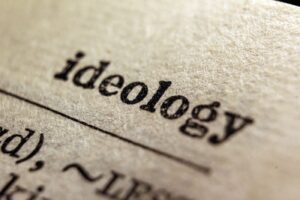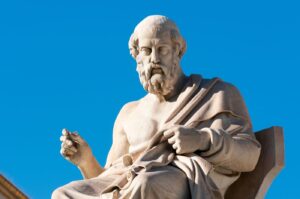Thaddeus J. Kozinski recently suggested here on Public Discourse that “only an ethics rooted in the divinely revealed truth of creation-as-gift and creator-as-love can coherently and adequately make sense of the universal experience of ought.” The threat to coherence, in alternative accounts, comes from a tension between good and right: what is good appeals to our desire for happiness, but what is right has an obligatory cast to it that seems independent of, and sometimes in tension with, any requirement of happiness.
Kozinski argues that the proper resolution of this tension requires “more than what unaided, human moral experience and purely philosophical speculation…can provide.” He thus turns to Trinitarian reflections of God as a self-giver, and creation as gift, to show that our ultimate obligation is, in fact, to desire happiness for its own sake, “because that is precisely the way we justly show our gratitude for the good gift we have been given.”
We could describe this approach to the key moral concepts of good and ought as “top down.” While Kozinski thinks that there is a role for philosophical explanations of the experience of ought, he holds that none that has been put forth is adequate in the way the theological account is. So theology is the starting point for our understanding of the phenomenon both of obligation and of our orientation towards goods and the good. It appears that in the absence of the theological account, our ordinary moral notions will be ungrounded, perhaps to the point of seeming like merely arbitrary projections.
The task of understanding our moral concepts and judgments, and of providing an adequate and critically reflective account of them, is indeed essential. As Robert P. George and I wrote in Embryo, ethical theory “seeks to identify principles of right action. By the identification of such principles, moral agents are guided in their deliberation about what they may do, must do, and must refrain from doing.” In the absence of such articulated and defended principles, however, and in the absence of a common cultural and religious framework undergirding a shared set of mores, once widely held principles such as the sanctity of human life or the norm against lying become held without conviction or abandoned entirely. So the stakes are high in thinking about the foundations of morality.
For this and other reasons, Kozinski’s starting point seems mistaken. In terms of what is likely to make sense of moral norms to a secular and suspicious culture, appeal to a Trinitarian theology, though, I believe, permissible in the public square, will probably be found wanting. Pragmatically, it violates Aquinas’ dictum that “if you are disputing with people who accept no authority, you must resort to natural reason.”
Start your day with Public Discourse
Sign up and get our daily essays sent straight to your inbox.Moreover, natural reason seems prior to the sort of Trinitarian reflections put forth by Kozinski, even by his own standards: he writes of our duty to respond to God’s gift to us with love and gratitude, and this is surely correct. Yet this presupposes an awareness of love and gratitude as the appropriately obligatory response to the phenomena of gifts and giving. And indeed, even faith itself seems possible only to those who are aware prior to the act of faith of the obligation to believe. So some moral truths are available to us, and can be properly understood and defended, in the absence of a well-worked out Trinitarianism.
Where does reflection on such moral truths begin? Not, I think, with the experience of obligation, but with our practical apprehension of goods, of aspects of human wellbeing whose desirability makes action possible. This leads to two other realizations: First, that such goods as we recognize as perfective of us are likewise perfective of others like us. Second, that such goods are multiple in nature, and not able to be pursued, by any of us, in an all-encompassing way. Choices are thus necessary between good options, and it is in thinking reasonably through our choices about goods that we experience the phenomenon to which Kozinski points, that of obligation.
To see this more clearly, we must note again the multiplicity of goods: we are perfected by life and health, but also by knowledge; by friendship and marriage, but also by play and aesthetic experience. These goods, and others such as personal integrity and, in a sense to be explained shortly, religion, are recognized as promising benefits that may be pursued in action. But not all goods and all benefits may be pursued in their entirety: we are limited beings, and thus we find ourselves with mutually exclusive options for choice—to pursue this course of action for the sake of our health, or that for the sake of our friend, where choosing the one means giving up on the other. Such choices should not be made randomly; they require a standard, a standard by which it will be possible to determine what we ought to do.
This standard is not to be found in the comparative goodness of the goods; if options could be so determined, there would be no free choices, for the option promising less good would cease to be a real option. But such choices can be governed either by reason or by feelings. The problem with feelings is that they are notoriously partial in many ways: to the good here and now, to the good for me rather than for you, to the good that appeals to what I want rather than to what I have made a commitment to or to what is a more genuine realization of a good.
In all these ways desire can fetter reason and turn us from a directedness and openness to the goods themselves. The standard for moral choices is thus: complete or integral openness to all the goods in all persons. Reflection on this standard makes moral norms clear, both theoretically and practically. For example, a choice directly against a basic good cannot ever be reasonable, for it is not fully open to the good chosen against. And so, the reasonable agent recognizes that it is always wrong to intentionally kill another human being.
I noted earlier that among the goods that are fundamentally perfective of human persons is the good of religion. Should religion not, then, be considered the highest good? No, it should not: A proper relationship to whatever more-than-human source of meaning and value exists is a perfection that human beings should seek—we are better off for being in that relationship. But it is one perfection among many, different in its goodness from the perfection that is constituted by a just ordering of our social relations, or the mutual and comprehensive sharing of lives of spouses open in their marital acts to the procreation of children.
While the good of religion is not the only or highest good, reflection leads us to recognize it as the most architectonic. For if the more-than-human source of meaning is our creator and causal sustainer, then all that we do in pursuit of human goods and human flourishing is done with that being’s cooperation. That being sustains us and our acts, and also is responsible for our creation as beings of this nature, with goods of these sorts, and with a reason by which we may know and a will by which we may choose these goods. Such a being apparently has our good in mind in creating us, and an appropriate response to this truth is to be rightly ordered to this being, in everything that we do, by attitudes and emotions of cooperation and gratitude towards that being. In other words, in every choice that we make, we should see ourselves also as pursuing the good of religion, the good of being in the right relationship to the greater-than-human source of everything.
Moreover, it is reasonable to expect that such a creating and sustaining being is personal in some way, and thus to expect that this being has revealed itself to us. Should that expectation turn out to be vindicated, then what that revelation tells us about that creator, and about ourselves, will provide important aids to our understanding both of human goods and of what reasonableness requires in choosing among such goods. Should that revelation tell us that this being’s nature is love, we will understand all the more our obligation to pursue goods for others in a self-giving manner. Should that revelation tell us that this being’s nature is also truth, then we will refuse to be conformed to a world in which truth may be sacrificed for some “greater” good.
The reflections I have here offered, brief and certainly far from exhaustive, are nevertheless an example of a more “bottom up” approach than that taken by Kozinski. Like Kozinski, I think that good and ought are ultimately reconcilable, for ought emerges from the requirements of reason in pursuing a multitude of goods. And like Kozinski, I think that our pursuit of those goods should be modeled on what we can learn of the life and nature of the being who has made all these goods available to us. But the former of these insights genuinely comes first, and is available to natural reason, both in the course of our personal deliberations, and in arguments in the public square about, inter alia, the sanctity of life, justice and injustice in war, the nature of marriage, and even the importance of religion itself in a culture and polity. The requirements of natural reason in the pursuit of goods—which requirements have been known for centuries as the natural law—provide a more adequate starting point for the work of moral reflection than the sorts of theological and ultimately Trinitarian considerations in which moral reflection should come to its fruition.










